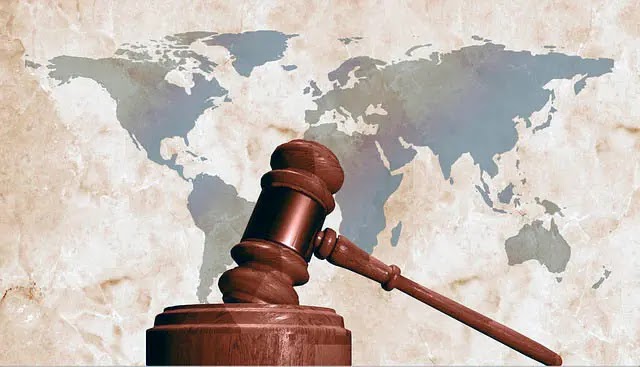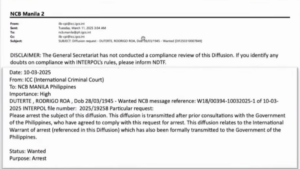
ICC Jurisdiction and the Philippines’ Withdrawal
In 2018, then-President Rodrigo Duterte initiated the Philippines’ withdrawal from the Rome Statute—the treaty that established the International Criminal Court (ICC)—which formally took effect on March 17, 2019.
However, under Article 127 of the Rome Statute, a State Party’s withdrawal does not affect the ICC’s jurisdiction over crimes committed while it was still a member. The ICC, therefore, retains full authority to investigate and prosecute crimes allegedly committed in the Philippines between November 1, 2011, and March 16, 2019.
This principle was affirmed by the Philippine Supreme Court in Pangilinan v. Cayetano (G.R. No. 238875, March 16, 2021), where it ruled that despite the Philippines’ withdrawal, the obligation to cooperate with the ICC remains for acts committed during the period of membership.
INTERPOL’s Role in Duterte’s Arrest
Despite its withdrawal from the ICC, the Philippines remains a member of the International Criminal Police Organization (INTERPOL), obligating it to cooperate with international law enforcement initiatives.
Through INTERPOL’s diffusion system—a form of notice used to alert member countries of wanted individuals—Philippine authorities received a communication on March 11, 2025, at 3:04 AM requesting the location and arrest of Duterte “with a view to extradition”.

Courtesy of the Senate of the Philippines Hearing
Unlike the more formal Red Notice, a diffusion is sent directly between national police bureaus but holds the same operational urgency when prior consultation and cooperation agreements exist.
Contentious Issues Surrounding Duterte’s Surrender
Critics argued that the Philippines, having withdrawn from the ICC, was no longer under treaty obligation to surrender Duterte. However, during a Senate hearing on April 10, 2025, official documents revealed that the Philippine government, through prior consultations with the ICC, voluntarily agreed to facilitate Duterte’s arrest.
The Diffusion Notice explicitly stated:
“The diffusion is transmitted after prior consultations with the Government of the Philippines, who have agreed to comply with the request of this arrest.”

Courtesy of the Senate of the Philippines Hearing
The legal controversy heightened when Duterte was surrendered directly to the ICC.
Ordinarily, Article 59 of the Rome Statute mandates the arrested individual’s appearance before a local court for procedural confirmation. Nonetheless, the Philippine government cited Republic Act No. 9851—the “Philippine Act on Crimes Against International Humanitarian Law, Genocide, and Other Crimes Against Humanity”—as the domestic legal basis for the direct surrender.
Section 17 of R.A. No. 9851 provides:
“In the interest of justice, the relevant Philippine authorities may dispense with the investigation or prosecution… if another court or international tribunal is already conducting the investigation… Instead, the authorities may surrender or extradite suspected or accused persons in the Philippines to the appropriate international court.”
This provision allowed the Philippine authorities to surrender an individual, aligning their actions with both the foregoing national and international legal frameworks.
Sovereignty vs. Global Accountability
The Duterte arrest underscores the tension between national sovereignty and the global movement for accountability.
Some political factions denounced the move as a violation of Philippine independence, while human rights advocates applauded it as a vital assertion that no leader is above international law.
The episode further illustrates an important point: withdrawal from a multilateral treaty like the Rome Statute does not shield a country from obligations regarding crimes committed while it was a member. International justice mechanisms remain operational even amid evolving national positions.
Timeline of Key Events
- March 11, 2025: Duterte arrested by Philippine law enforcement based on INTERPOL diffusion.
- March 13, 2025: Duterte transferred to ICC custody and flown to The Hague, Netherlands.
- March 18, 2025: Duterte’s first appearance before ICC Pre-Trial Chamber I; “not guilty” plea entered on his behalf.
- April 10, 2025: Senate hearing disclosed documentation showing prior agreement to cooperate with the ICC.
- April 24, 2025: ICC Pre-Trial Chamber scheduled confirmation of charges hearing for September 2025.
As proceedings at The Hague continue, the world will closely watch how the Philippines’ legal and political institutions respond to the evolving demands of global justice.
- Rome Statute of the International Criminal Court, Art. 127(2).
- Pangilinan v. Cayetano, G.R. No. 238875, March 16, 2021, Philippine Supreme Court.
- INTERPOL Diffusion Notice regarding Rodrigo Duterte, received March 11, 2025.
- Transcript of Philippine Senate Hearing, April 10, 2025, Third Session on ICC Arrest of Duterte.
- Rome Statute of the International Criminal Court, Art. 59.
- Republic Act No. 9851 (2009), Section 17.


